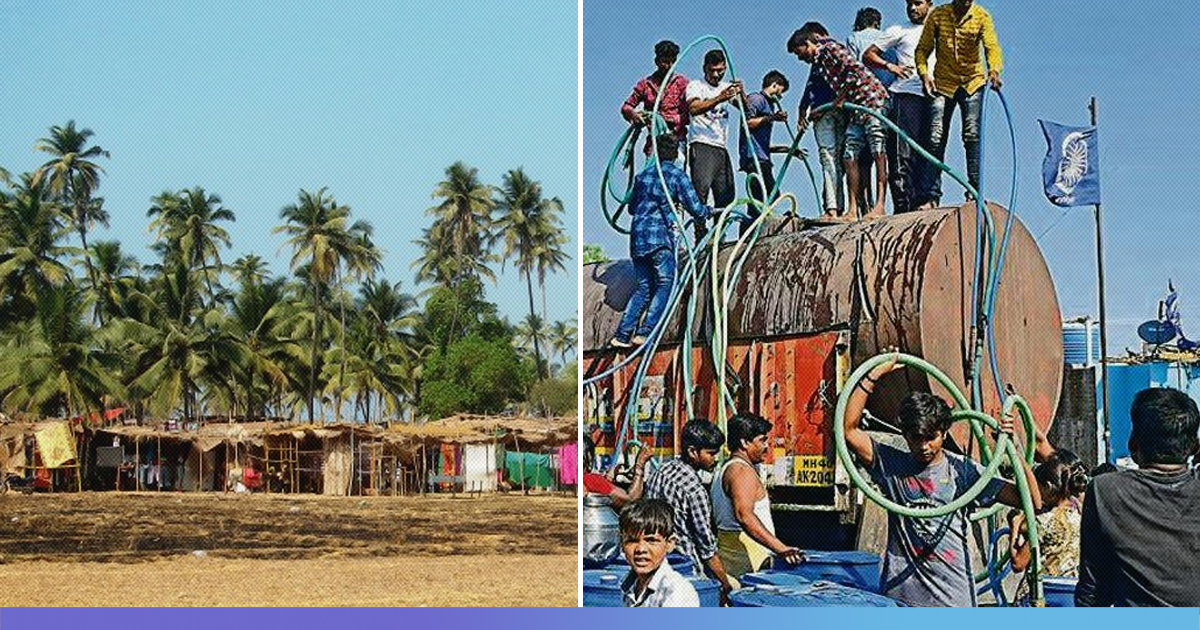Assagao and Anjuna have shown the way to the villages of India which are ignored by the administration and exploited by the powerful. With Goa Foundation’s Legal Aid team by their side, Erwin Fonesca and his team of three, have emerged victorious in the legal battle they fought against the water mafia in their village.
A rapid influx of non-local residents, due to Goa’s ever increasingly popularity, has considerably changed their demographics and economics. Anjuna especially, has seen many new settlements sprouting in its vicinity, mostly inhabited by people from the north of India.
Owing to the shift in business practices with the incoming of a large number of non-local residents, many brand-new restaurants and hotels have been established around Assagao and Anjuna. These hotels, pubs and restaurants are host to tourists, travelers and the recently-settled residents.
These installations of the hospitality industry need an inexhaustible store of resources to provide their guests the comfort promised. The burden of their lavish requirements falls on the innocent villages a few kilometers away, the occupants of which are naive to shrewd business tactics and have only known a life of balance and need based sustenance.

Mukesh Sawant, resident of Assagao, notorious for coming from a family which has a history of land grabbing, theft and illegal construction, had installed two illegal borewells around the area close to the Assagao-Anjuna border in order to help hotels maintain their endless supply of water and stash himself with the moolah that it would bring.
His illegal installation had triggered an unprecedented shortage of water in the two predominantly farming villages – where almost every household has its own well for domestic and agricultural needs.
The malicious act of illegal groundwater extraction manifested very real and dark consequences for the farmers who saw rapid depletion in the water levels of their wells. Although February is known to be a dry season, 2019’s February was a completely dry and dark time.
“There wasn’t a drop of water to drink let alone for the purpose of our farmlands”, Erwin Fonesca told The Logical Indian.

“My well was dried in February, it is located on my ancestral property,” Fonesca said. “Wells here is our only source of water. The government provides tap water but it is dirty and erratic in supply, hence unreliable. The water from our wells is clean and potable.”
He was one among the four petitioners from Assagao, who, with the help of Goa Foundation’s Legal Aid Clinic, delivered justice to the villagers by winning the case against Mukesh Sawant’s illegal extractions in front of the Panjim Bench of the Bombay High Court.
Goa Foundation, an environment protectionist group was founded in 1986 by a handful of Goan environmentalists. Its most recent initiative is the Legal Aid Clinic.
The case was taken up by Justices Mahesh Sonak and Nutan Sardesai.
Mukesh Sawant extracted water from his borewells and sold it to hotels around Anjuna, which is close to Vagator beach where one may find a line up of hotels and lodges. “He did so at the expense of the villagers, depriving them of the most basic resource needed for survival and sustaining a livelihood”, Anamika Gode, the lawyer representing the case of the villagers told The Logical Indian.
“Water scarcity is a common phenomenon every summer due to the escalating global climatic crisis but this year’s complete water deprivation was caused by the illegal borewells of Mukesh Sawant”, Fonseca said.
He had obtained permission for an open well 2015, but had begun commercial extraction way before its registration. In addition to that, he had also got two borewells dug.

Working on the case since 2014, Erwin Fonesca told The Logical Indian that the Water Resource Department (WRD) has prescribed rules for well digging. Official permission needs to be sought for registering a well regardless of whether it earmarked for domestic or commercial use.
For a permitted commercial well, a meter needs to be fixed and tanker movements need to be recorded regularly. The quantity of water allowed to be extracted is also fixed by WRD and how much water the owners of the well are pumping needs to go in the records too.
Sawant’s exploitation of his borewell for illegal water sale was not only deteriorating the ecosystem but also jeopardising the interests of the villagers. Fonesca pointed out that such unchecked water sales inflict heavy losses in terms of revenue to the government’s exchequer.
His team of four had complained to the WRD but their grievance had fallen on deaf ears. As per him, the WRD of Goa is under tremendous political pressure and due to that, the officials visited his village but had only come to honour their complaint and carried out a frivolous inspection of Sawant’s site.
Sawant received many show-cause notices post the inspection, since 2014, but no substantial action was taken.
With the passing of a few months since the villagers’ campaign for their rights, the WRD wrote to the electricity board to cut Sawant’s power supply and filed an FIR with the police. But there was no end to Sawant’s illicit activites.
Fed up with that attitude Fonesca decided to approach the Goa Foundation. He empowered his case with data and facts collected through RTIs filed by him. “A lot of the basic groundwork had already been done”, he told The Logical Indian.
The Goa Foundation decided to file a PIL (public interest litigation) in the court.
Justices Mahesh Sonak and Nutan Sardesai then pulled up the WRD for their inaction and asked for a compliance report.
“Prompt action was taken by the authorities once directed by the Hon’ble Court”, said Anamika Gode, the lawyer.
Panjim bench’s proactive nature in hearing and solving this case was a pleasant surprise to everyone arguing on behalf of the villagers. “I believe that the judges understood how critical the matter was since it was centered around human kind’s most important resource for survival”, Anamika said.
Fonesca’s fact-finding through RTI applications had helped him learn that the permission for the open well was given to Mukesh Sawant by the Anjuna panchayat. An NOC was given to him by the village’s elected body of governors.
The petitioners decided to have a structured ‘bottom-to-top’ approach for fighting their case and hence complained to the WRD – that had given Sawant the NOC. Disappointingly, they did not pay any heed to them, even when the law of the land empowers them to act to rectify such cases.
Owing to such inaction, Sawant’s illegal water sale went on for two years and in what can be called a cruel joke, he even supplied water to Assagao during the months of 2019’s dry spell – March and April – pretending to be a messiah to the thirsted population.
Out of the four petitioners, he had audaciously approached two of them with an offer of a win-win barter. “He bribed them saying he’ll supply water free of cost during the scarcity if they withdrew from our fight”, Fonseca said.
But amidst all the discouragement that came in the form of administrative indifference, the court’s driven attitude throughout was a saving grace for Lawyer Gode and Fonesca.
“The judicial machinery was with us throughout and no leniency was shown by them to the offender. I guess they wanted it to be a trend-setter for cases of environmental exploitation”, he said.
The petitioners demanded that Sawant be made to uninstall his borewells, which were anyway illict. The complete removal of the illegal borewells was ensured by the authorities, and photographs and a compliance report was submitted to the Court. The Hon’ble Court also directed that a sworn affidavit be submitted by Sawant that he will not use his registered open well for commercial purposes.
“The affidavit was demanded by the Court in light of the fact that Sawant was a repeat offender.”, she concluded.
Now, the WRD has initiated an independent criminal proceeding against him where he has been booked and is being prosecuted for theft.
“The court has assured us that the case will be reopened if he’s found repeating his offences again”, Fonesca said sounding relieved after five years of his crusade for environmental justice.
This case has set an example and now many cases of the same nature are coming to court and the WRD for solutions.

In the months his village spent gripping with water scarcity, life was extremely difficult and most people bore unimaginable expenses. Water-tankers that were called in regularly were expensive.
The villagers also engaged in well-deepening although it didn’t yield results for most of them. It was a big financial burden as even their farmlands were infertile and useless due to lack of water. “I incurred a total loss of Rs 60,000 in the first quarter of 2019”, Fonesca said in closing.











